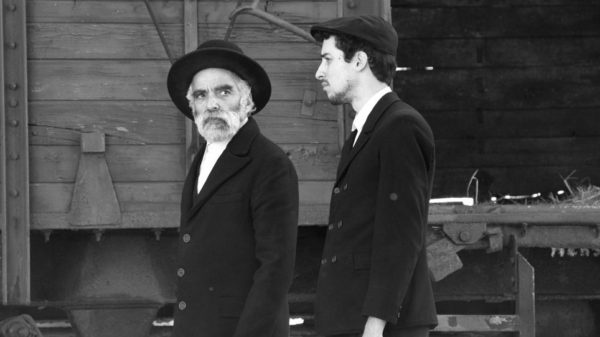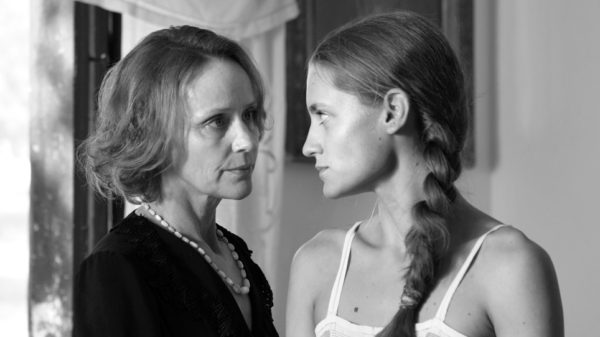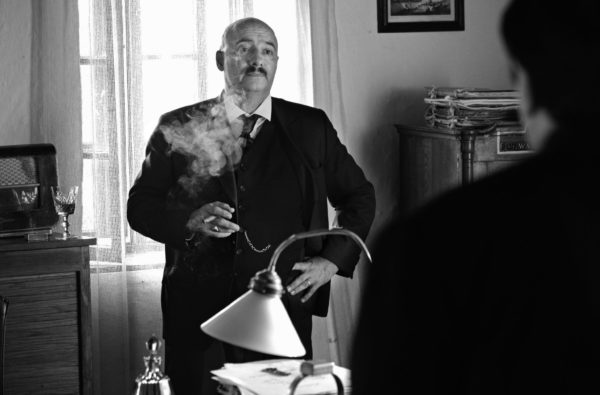Ferenc Torok’s strong and unadorned film, 1945, opens as a passenger train, its locomotive belching thick black smoke, pulls into into a sleepy station in the Hungarian countryside. It’s a sweltering morning in August of 1945, and a year has elapsed since the end of World War II. As the train hisses to a shuddering stop to unload passengers and cargo, the station master (Istvan Znamenak) greets the conductor on the platform. Nearby, in a house, the town clerk, Istvan Szenkes (Peter Rudolf), is busy shaving and listening to a newscast about the war in the Pacific. His wife, Anna (Eszter Nagy-Kalozy), is still asleep.
The ordinariness of these innocuous moments belies what lies ahead. This unnamed town, far from the bright lights of Budapest, is on the cusp of a painful reckoning with its recent past. The first sign that this may be an unusual day occurs when two visibly-looking Orthodox Jews (Ivan Angelus and Marcell Nagy) step off the train. The suspicious station master wants to question them about two small crates that have been removed from the train on their behalf, but they’re waved through by Russian soldiers sitting in a jeep.

Who are these Jews? Why are they here? Torok’s suspenseful black-and-white movie, which will be presented by the Toronto Jewish Film Festival on May 4 and May 10, eventually answers these pressing questions.
Having been cleared, the two Jewish men, a father and a son, hire a driver to transport their possessions into the town. The common assumption is that their crates contain perfume, cologne and soap. Szenkes instructs the driver to proceed slowly as he investigates the matter. The Jews walk behind the horse-drawn cart rather than hitch a ride on it. It appears as if they’re following a funeral procession. The symbolism is deliberate.
Their arrival coincides with the planned wedding of Szenkes’ son, Arpad (Bence Tasnadi), who’s getting married to Rozsi (Dora Sztarenki). Ever resourceful, Szenkes has seen to it that Arpad will be able to make a living after his marriage, having bequeathed the local drugstore to him. Unbeknownst to Arpad, Rozsi is having an affair with her old boyfriend, Jancsi (Tamas Kimmel), who’s partial to the new political order in postwar Hungary. In a tart conversation with Rozsi, Arpad’s protective, drug-addled mother bluntly asks her if she really loves her son.

These glimpses of life are sideshows compared to what happens next.
“Jews have arrived,” the station master frantically informs Szenkes. “You just can’t get rid of them,” chimes in the town’s policeman shortly afterward.
The presence of the Jews worries Szenkes. He wonders whether they’ve been sent by an influential Jewish family, the Pollaks, to reclaim their drugstore. Like many other towns in Hungary during the German occupation, this town was shorn of its Jewish population by deportations to the Auschwitz-Birkenau extermination camp in 1944. Taking advantage of the deportations, some Hungarians ravenously scooped up Jewish properties and household goods through illegal or inappropriate means.

This is what concerns Szenkes now. Will he be forced to return his ill-gotten gains, including the drugstore, to its rightful owner? As rumors circulate that Jews are returning to take back what was theirs, a woman who commandeered a Jewish-owned house and its furniture expresses her determination to keep them. “If anyone asks, the stuff isn’t here, the Germans took it — or the Russians,” she says, revealing her unbridled guile and greed.
With the apparent exception of Bandi (Jozsef Szarvas), a guilt-stricken older man, virtually all the townspeople are content with the status quo. They know, in their heart of hearts, that they’re complicit in the wholesale theft of Jewish property, but they couldn’t care less. The local priest is keenly aware of the situation, but he, too, is turning a blind eye. Their attitude is that the past should be buried and forgotten.
Thanks to a fine script, an excellent cast and Torok’s able direction, 1945 grapples with these moral issues openly and courageously.